Hack Job? Dodge Depot Hack
The dry climate of the desert southwest has been the source of many old cars and trucks for collectors and restorers for a long, long time. This old Dodge is a depot hack model, and therefore pretty rare.
For those of us too young to remember them in daily use, Depot Hacks were mostly produced during the nineteen teens and twenties. The Owls Head Museum provides the following definition: Depot Hacks were designed to carry passengers and their luggage from the train station, or Depot, to their final destination, typically a hotel. Today, we call this type of vehicle a Taxi, which is what the word Hackney means. Hack is an abbreviated form of Hackney. Below is an example of a Ford depot hack.
Today’s desert find is what the seller says is a 1918/20 Dodge Depot Hack. It’s for sale here on craigslist in Tucson, Arizona, with an asking price of $3,150.
It’s pretty easy to discern from the photos provided, that this truck has been sitting outside for a very long time. The seller is very enthusiastic about his vehicle, even though it plainly needs an immense amount of work.
The ad states that you “must see to believe the condition of the Gauges, Wheels, Hubs, Seats, etc.” It’s called “solid” and “rusty but not dying of cancer…” And it almost goes without saying that it will need all the wood replaced – running boards, steering wheel and bed (and whatever body you might want to rebuild from scratch!)
The seller even claims that his Dodge is “believed to still run!” which appears to be wishful thinking on his part.
Undertaking some research online to find out what I could about this particular Dodge, and was amazed to find that what appears to be this very same vehicle was for sale in Tucson in 2006! It was the subject of a long discussion on the AACA member forum at that time.
In 2006, the truck’s asking price was a lofty $7,500, and apparently it has not found a buyer during the last ten years. Note that the photos in the CL ad are dated 2009, which is further evidence it may still be with its original seller.
Reading the various forum contributions, I found one knowledgeable reader who says that this truck is actually a 1920-21 model. According to this source, the wheels are the first series Kelsey 25″ that were used only during that period. The spring cover on the forward part of the rear fender is a transition from the 1919 models to 1920. The doors are wrong for the truck and are from a 1920-21 touring car. He further states that the engine and transmission is from a 1924 Dodge. If you want to read the forum conversation, you can find it here.
Yes, it is rusty and weathered, but we’ve all seen a lot of cars that were far less complete than this one. Still, you have to wonder if this truck will ever find a buyer who will restore it. Working vehicles that went through the Depression were often modified by their owners, using whatever parts could be found to keep them running. Because this old Dodge is not “original” anymore, and will take so much work and cost to restore, perhaps this will end up as a hot rod or rat rod build.
Here is a slightly more modern 1925 Dodge Depot Hack, in far better condition than the example for sale here.
This beauty sold at the Scottsdale Barrett-Jackson auction in 2009 for only $9900, which makes me wonder whether today’s find may not be financially worthwhile to restore.
That’s the Dodge Brothers emblem – the founding brothers both died in 1920, and in 1928 their company was sold to Chrysler.
So what do you all think of this old deserted hack?
Auctions Ending Soon
 2002 Subaru Impreza WRXBid Now2 days$333
2002 Subaru Impreza WRXBid Now2 days$333
 1975 Chevrolet Corvette ConvertibleBid Now2 days$4,000
1975 Chevrolet Corvette ConvertibleBid Now2 days$4,000
 1964 Ford F-100 Camper CustomBid Now2 days$2,000
1964 Ford F-100 Camper CustomBid Now2 days$2,000
 2006 Jeep Wrangler SportBid Now4 days$10,500
2006 Jeep Wrangler SportBid Now4 days$10,500
 1974 Datsun 260ZBid Now6 days$200
1974 Datsun 260ZBid Now6 days$200
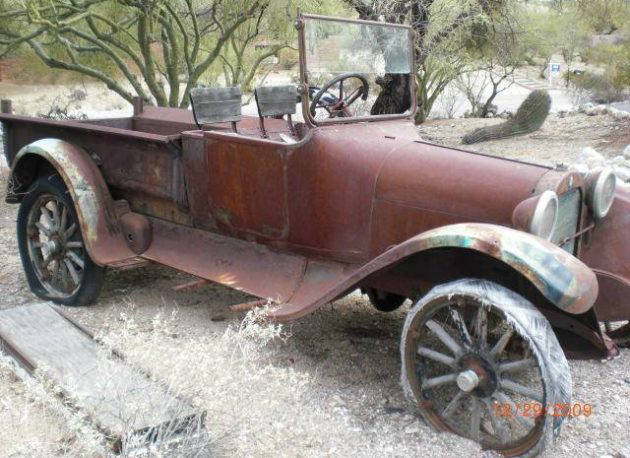
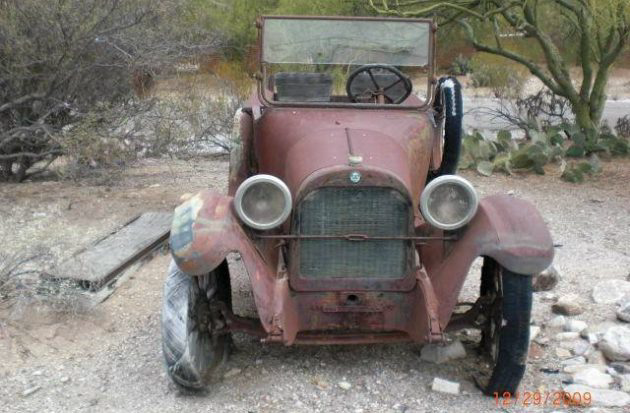
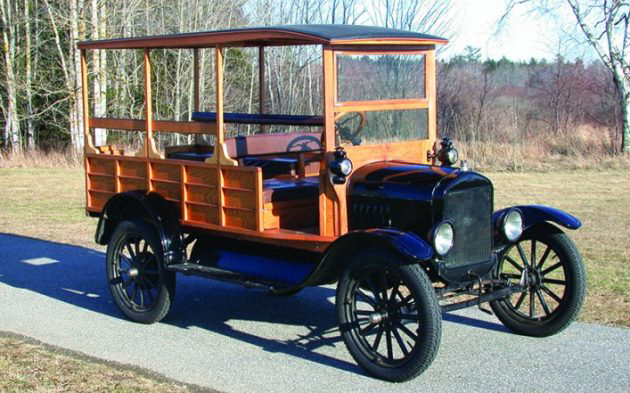
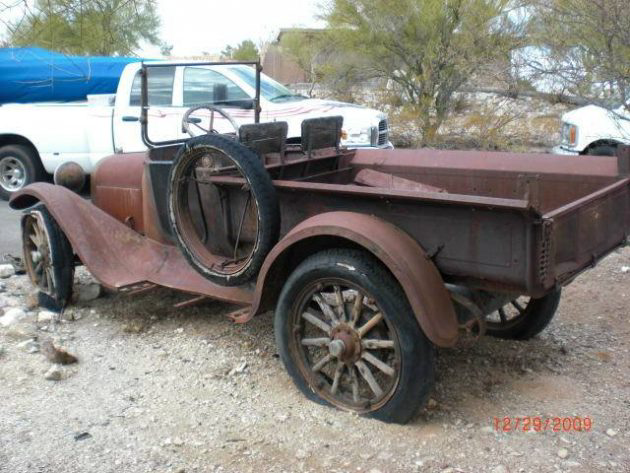



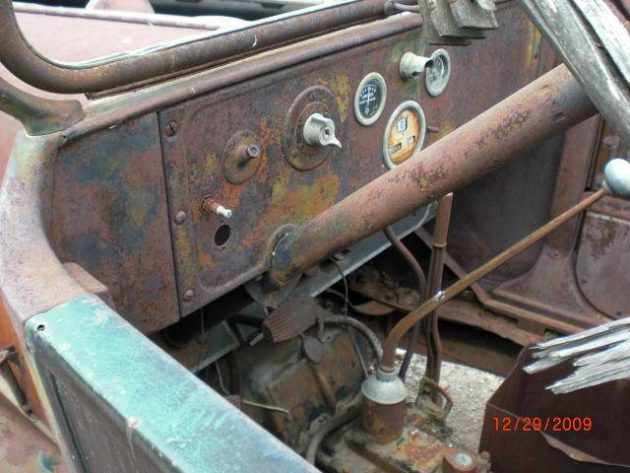
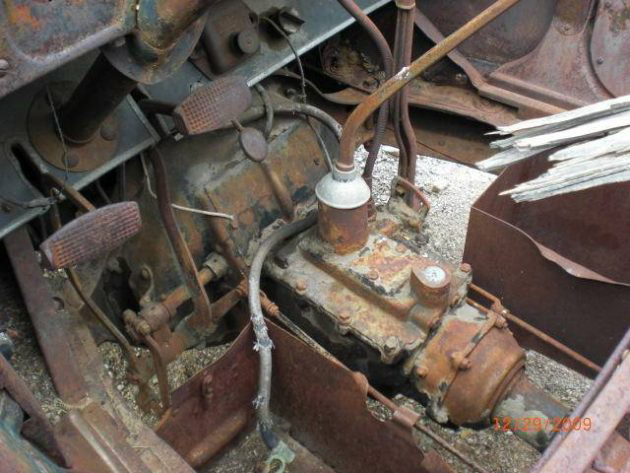
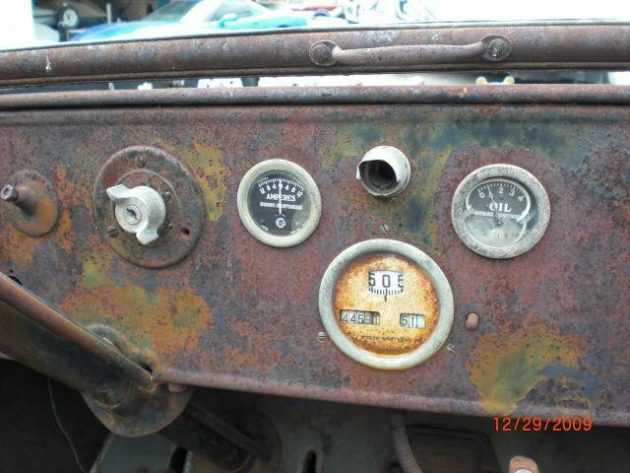

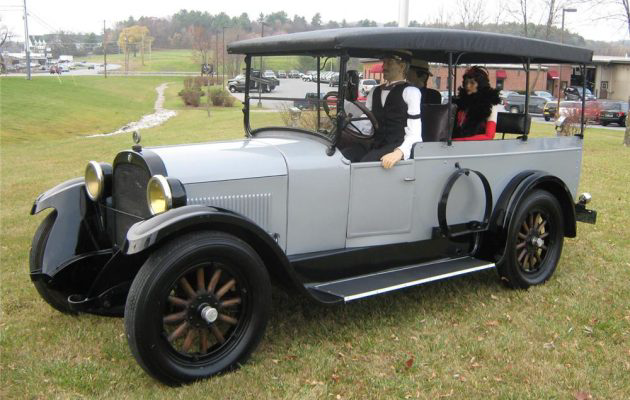
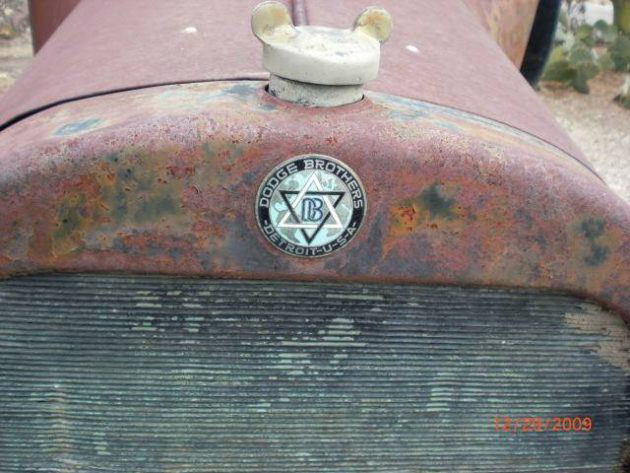


Comments
I like what I see although I fail to see anything more than a roadster pickup here; I cannot see how it becomes a Depot Hack. That being said, I like it as a roadster pickup and that’s how I would restore it. Looks like a lot of fun ahead for the buyer.
Restoring this or anything else is more about the journey than the cost(s) involved. If you’re looking at restoring this as an investment then I think there are better places to put your money. However if you want to restore this and enjoy it to the max then it becomes a very worthwhile investment. It’s about the frozen bolts, the rust in the eyes, the rodent nests in the interior. There’s no greater thrill than taking something like this and making it new again….
No rodents nest in the interior…the snakes hiding under the hood ate them
Hi Jeffro. Snakes could be a problem. Sometimes they come with the truck at no extra cost…
With that bed, could this be a “Graham Canopy Express” body?
Hi D-Ozzie. It never crossed my mind that it could be a canopy express. That makes a lot more sense than a Depot Hack. Thanks.
Wonder how it functioned as a depot hack with those flanged box sides?
This was probably a conversion from a car during the war. This was done because of gas rationing. Pickups would receive more fuel. Some of the statements above are not accurate. The Dodge company was sold by the Dodge widows in 1925 to a banker for 146 million. Then it was sold to Chrysler in 1928 for 175 million.
We have a 1925 Dodge Merchant truck also.
More info
http://www.americanautohistory.com/Marques/Marque740.htm
Do you have any 1939-47 dodge pickups or parts for sale ?
I believe what we have here, is called an “Express Wagon”. Lot of work here, but just not many left. So you plunk down $7g’s to get it, n & b resto, got to cost you 50g’s, minimum, that’s a lot of change for something you really can’t use. You can see the detail of the mechanical brakes on this. ( 2 rods going back) I always wondered how mechanical brakes would work, with the rear axle going up and down, and how did the front, if any, work with the steering. It had a top connected to those 2 things by the tailgate and formed the roof of the cab ( long gone) and had a separate box. Too far gone for most. http://automuseumonline.com/wp-content/uploads/2013/08/IMG_0628.jpg
It’s a Dodge Brothers Screenside Commercial Car. Though I would probably leave it as a “Roadster Pickup.”
The image attached is a later one (about 1923, I think), but you get the idea.
That’s a beautiful thing! Pity she’s such a major job. But most ladies take a lot of time and money
Yes, most ladies take as much as they can . . . and then they leave you high and dry!
Get it safely running and enjoy.
GET IT RUNNING?? The engine/trans has probably solidified into ferrous oxide. I think it’s yard art only
What temptation!! This has a look that makes you want to have it, and restore it to near original, but that assumes your lottery ticket was a substantial winner. It is in spite of its’ rust an appealing vehicle. It is like geomechs said, about the journey…
Alas, I have two projects (journeys) going already, and no winning tickets…
Good luck to somebody…
Matt
I know it’s the wrong make, but boy does this give me a Beverly Hillbilly vibe. Unfortunately any restoration is going to put you upside down on this. It’s a shame because I have fond memories of these coming up the street when I was young selling everything from fruit to hams. Many of these 20’s and 30’s trucks were still working into the early 60’s. It deserves to be saved if only in a museum.
Heh, where do you start???
Looks like the, donor for the Barris created Beverley Hillbilly’s Truck